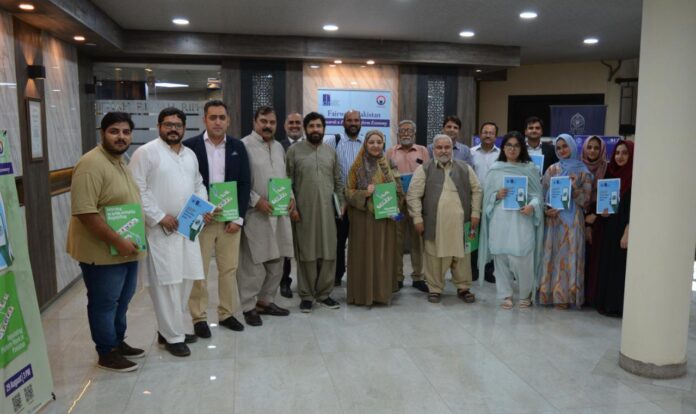Spokesman Report
Islamabad: Pakistan has nearly 2 percent of its labour force engaged in the gig economy through online and location-based services. An estimated 700,000 workers in the country work in the location-based platform economy, but it has been encouraging a race to the bottom regarding working conditions. Six of the most popular gig economy platforms in Pakistan have been rated according to how fairly they treat workers. None of the platforms were able to earn a score this year. The study found that all of the companies, namely, Bykea, Careem, Foodpanda, GharPar, inDrive, and Uber failed to ensure minimum standards of fair work – such as ensuring all workers earn above the national minimum wage. This is the first study of its kind in Pakistan, scoring companies on labour standards such as pay, employment conditions, contracts, management and representation.
Dr. Mahmood Khalid (Senior Research Economist, Macro Policy Lab PIDE), Zahoor Awan, Member of ILO Governing Body from Pakistan, Waqar Memon, General Secretary, Pakistan Workers Federation, Raja Faiz ul Hassan Faiz (Former Central Labour Law Advisor) and Azhar Malik (Deputy Secretary HRD, Ministry of OP and HRD) were the panelists at the launch event of the Fairwork Report.
Iftikhar Ahmad, Founder CLR and Principal Investigator of the Fairwork Pakistan said”In our second annual report, we have conducted a comprehensive analysis of companies operating in ride-hailing, food delivery, and related sectors, focusing on their treatment of key workers. A noteworthy revelation is the emergence of an unexpected phenomenon: negative income among platform workers, where monthly expenses outweigh earnings. This report dives into significant issues such as the misclassification of workers and the dearth of adequate regulatory frameworks.”
The report, “Pakistan Ratings 2023: Labour Standards in the Platform Economy” ranks platforms against five principles of fair work, giving each company a score out of ten. The report finds that the majority of the six platforms are failing to meet the basic standards of fairness when benchmarked against the Fairwork principles.
Key findings:
· Fair Pay –None of the 6 platforms demonstrate their workers are guaranteed to be paid the minimum wage after costs.
· Fair Conditions – None of the 6 platforms provide sufficient protection from the task-related risks in their daily work.
· Fair Contracts – None of the 6 platforms analysed provided evidence of clear and accessible contracts or terms of service.
· Fair Management – None of the 6 platforms assessed by researchers have a formalized process where workers can appeal decisions.
· Fair Representation – None of the platforms allow for collective representation of workers.
Publishing this study, researchers from Centre for Labour Research, are calling for stronger protections and more robust labour standards in the Pakistan platform economy.
Zahida Perveen highlighted the gender imbalance in the platform economy, especially in South Asia and Pakistan, stressing the need for proactive measures to increase female participation in the gig economy. Dr. Mahmood Khalid added that the Platform tech giants and the rise of embedded finance have shattered the old norms of business and life, rendering “business-as-usual” and “life as usual” relics of the past while fostering innovation and trust in the ever-evolving platform economy.
In acknowledging the invaluable efforts of the Centre for Labour Research, Waqar Memon, General Secretary of Pakistan Workers Federation, emphasized the vital significance of upholding Fairwork’s principle of Fair representation for platform workers in the nation.
Azhar Malik ensured government’s support for the draft legislation on digital platform workers. Raja Faizul Hassan praised the draft legislation for platform workers and gave recommendations. All of them praised the collaboration between the Centre for Labour Research and Fairwork and their efforts in this regard and declared it a big step in the right direction.
As a way forward, the Centre for Labour Research has proposed a draft bill in collaboration with the Fairwork. The draft bill covers all Fairwork principles and gives platform workers all workplace rights including right to minimum wage, health and safety protection, data portability and data protection, accessibility to comprehensible employment contract, social protection, and various cash benefits from the PESSIs and EOBI including old-age pensions, grievance redressal mechanisms, protection from discrimination and harassment, and protection of right to unionise and bargain collectively. Over the past one year, the draft bill has been further improved in line with the suggestions received by various stakeholders.



